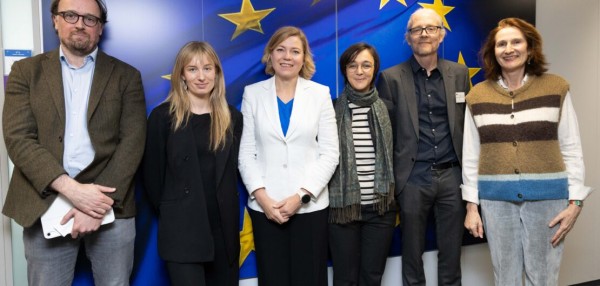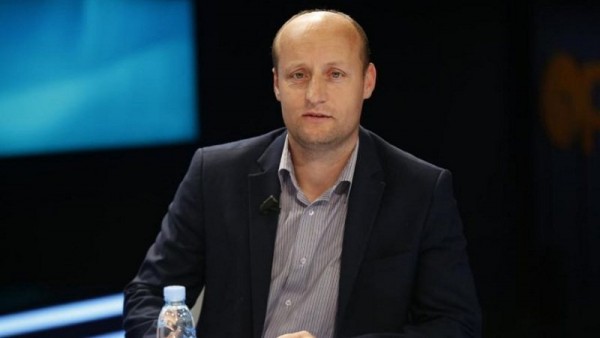IPI Press Freedom Manager Anthony Mills visited the EU Commission last week to discuss with various EU officials IPI’s Vienna Declaration on Terrorism, Media and the Law. He was accompanied by the lead drafter of the declaration, Toby Mendel, now executive director of the Canada-based Center for Law and Democracy and formerly senior director for law at freedom of expression advocacy organization ARTICLE 19.
The declaration, which states that everyone has the right to access diverse, uncensored sources of information and calls on states to create an environment that encourages the development of a diverse, pluralistic media sector, was presented in Brussels to coincide with the first-year anniversary of the IPI-CILS conference, “The War on Words – Terrorism, Media and the Law”, during which the declaration was drafted.
The declaration has been signed by 39 other freedom of expression organizations from across the world, including Reporters Without Borders, the Committee to Protect Journalists and Human Rights Watch.
Mills and Mendel met with the following EU officials: EU Counter-Terrorism Coordinator Gilles de Kerchove; Alexandra Knapton, member of the cabinet of European Commission Vice President Catherine Ashton responsible for human rights; Lars-Gunnar Wigemark, Head of Security Policy for the European Commission’s Directorate-General for External Relations; Tim Jones, Principal Adviser to the Council of the European Union; and Dana Trama-Zada and Telmo Baltasar, both Members of the Cabinet of European Commission Vice President Vivienne Reding, EU Commissioner for Justice, Fundamental Rights and Citizenship.
At the heart of the discussions was the suggestion that effective security and respect for freedom of expression and press freedom are not incompatible but, rather, complementary.
IPI Press Freedom Manager Anthony Mills said after the talks: “It is vital that those responsible for shaping anti-terror legislation and policies appreciate that a free media, with full access to information in the public interest, is actually an essential component in any effort to combat violence. Where there is a lack of information, misunderstanding thrives. An information vacuum can be manipulated by those seeking to promote violence and extremism.”
Participants in the talks agreed to follow up on possible future co-operation.
DECLARATION:
Everyone has the right to access diverse, uncensored sources of information. States should create an environment that encourages the development of a diverse, pluralistic media sector.
Media freedom, including editorial independence, should be respected by States and inter-governmental organisations. Specific obligations should not be imposed on media outlets in the pursuit of counter-terrorism.
The media should be free to report on terrorism, including terrorist acts and ideology, as long as this does not constitute intentional incitement to terrorism. Such reporting should not be penalised as ‘radicalising’ potential terrorists or under other vague and unduly broad grounds, such as ‘glorifying’, ‘justifying’ or ‘promoting’ terrorism or extremism.
The right of the media to report on violations of human rights and on the infringement of civil liberties should be respected.
Voluntary self-regulation is an important and appropriate means of promoting professionalism and high standards in the media. States should respect the right of the media to engage in self-regulation, which may include establishing standards of practice and other media accountability systems.
Policies and laws adopted with a view to combating terrorism should be consistent with international and constitutional standards, including guarantees of freedom of expression and of the media. In this regard, the notion of national security should not be abused to protect the government, powerful interests or particular ideologies, or to prevent the exposure of wrongdoing or incompetence.
States of emergency should not be declared outside of situations that threaten the life of the nation. Any limitations on rights during emergencies, including the right to freedom of expression and of the media, should be limited in ways and duration that are strictly required by the situation.
No State or inter-governmental organisation should seek to take control over a private or public media outlet, including during an emergency or terrorist threat.
States and inter-governmental organisations should recognise and respect the right of media workers and media outlets to protect the identity of their confidential sources of information.
The right to access information from public bodies, both national and international, as well as private bodies undertaking public functions, should be recognised in law and respected in practice through right to information laws (also known as access to information or freedom of information laws), in accordance with international standards. Public bodies should, in particular, avoid overbroad national security exceptions to the right to information.
Enforcement of counter-terrorism laws should never be arbitrary or conducted in bad faith and should always be subject to independent judicial oversight.
SIGNATORIES:
Access Info Europe
Adil Soz – International Foundation for Protection of Freedom of Speech, Kazakhstan
Association of Caribbean Media Workers (ACM)
Association of Independent Electronic Media (ANEM), Serbia
ARTICLE 19
Bahrain Center for Human Rights
Canadian Journalists for Free Expression (CJFE)
Center for Media Freedom and Responsibility, Philippines
Center for Media Studies and Peace Building, Liberia
Centre for Independent Journalism, Malaysia
Committee to Protect Journalists (CPJ)
Exiled Journalists Network, UK
Human Rights Watch
Independent Journalism Center, Moldova
International Federation of Journalists (IFJ)
International Press Institute (IPI)
Instituto Prensa y Sociedad de Venezuela (IPYS Venezuela)
Maharat Foundation, Lebanon
Media Foundation for West Africa
Media Institute of Southern Africa (MISA)
Media Rights Agenda, Nigeria
Media Watch, Bangladesh
Pacific Freedom Forum
Pakistan Press Foundation (PPF)
Palestinian Center for Development and Media Freedoms (MADA)
Privacy International
Public Association “Journalists”, Kyrgyzstan
Southeast Asia Press Alliance (SEAPA)
Pacific Islands News Association (PINA)
Reporters Without Borders (RSF)
World Association of Newspapers and News Publishers (WAN-IFRA)
World Press Freedom Committee (WPFC)


